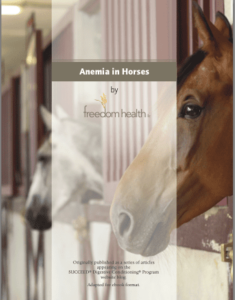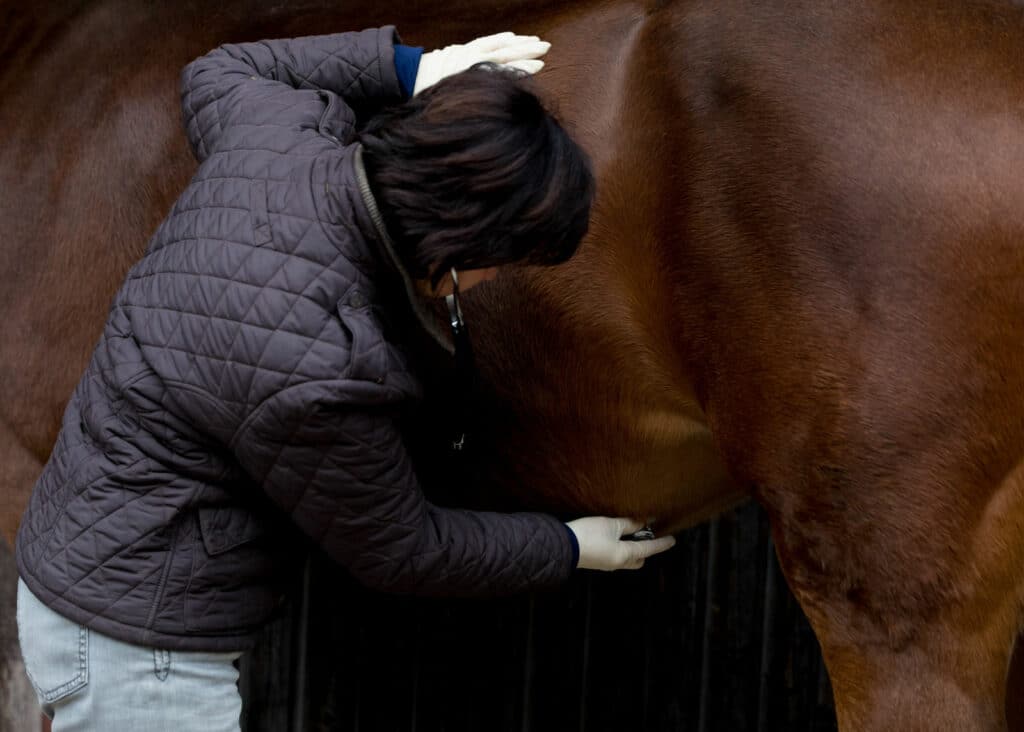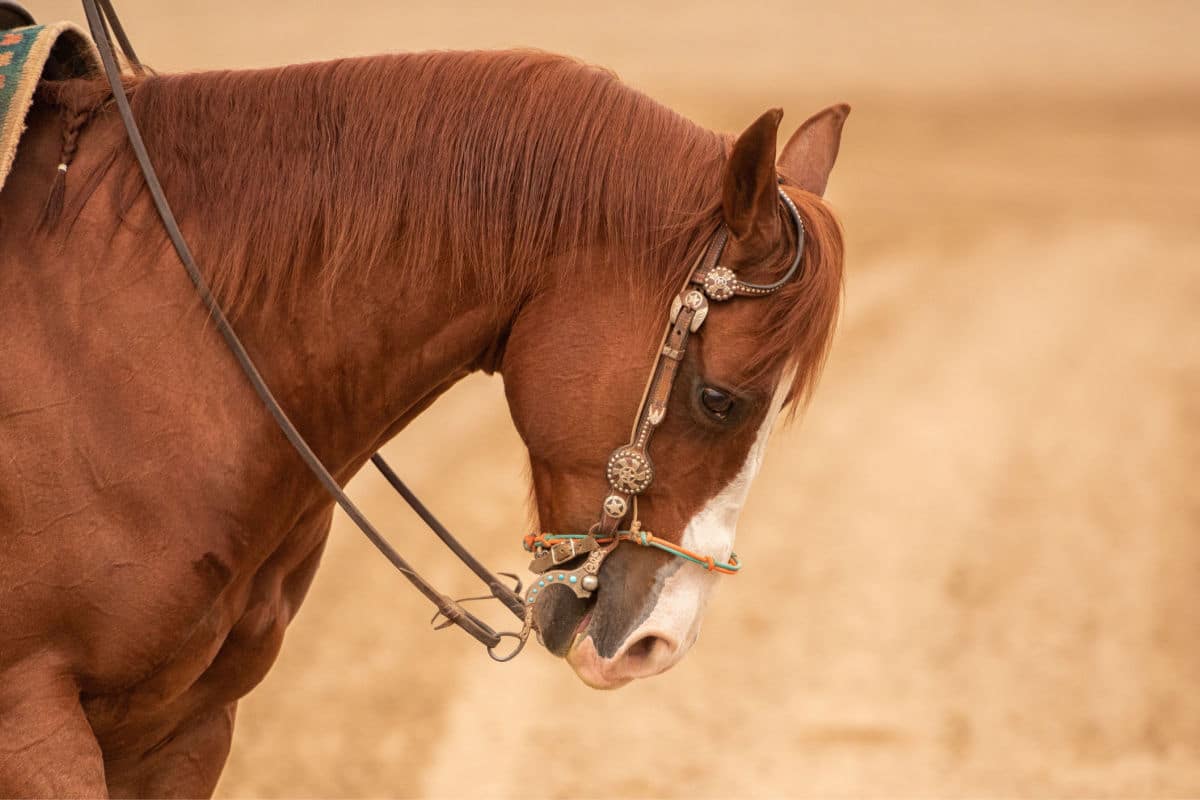Anemia in horses is rarely discussed outside of racing circles, but is an insidious condition with significant impact on a horse’s health and performance ability. In this five part series, we will provide a comprehensive look at equine anemia: what anemia is and how it affects horses, what causes equine anemia, signs and symptoms, ulcers and anemia, and treatments. Subscribe to the SUCCEED blog to follow the complete series.
So your horse has been diagnosed with anemia. You finally have an answer for why its performance has been declining, it’s lethargic, and it’s losing that healthy glow. You are proactive and ready to get your horse healthy. But before you jump into some of the common treatments for anemia, you need to consider two things: are they really effective, and what are you doing to treat the underlying disease that is causing the anemia?
One of the big mistakes that many people make with an anemic horse is to simply try to treat the anemia. The problem is that the most common treatment methods have little effect and do nothing to resolve the real issue – whatever health condition is causing the anemia.
Here’s a look at the two most common methods used with anemic horses and the importance of instead diagnosing and treating the underlying cause.
Why Supplementing to Treat Anemia is a Waste of Resources
The most common method used by many in an attempt to resolve equine anemia is supplementing with vitamins and minerals that are important to the process of red blood cell production. The two most widely used products are supplements that contain iron and/or Vitamin B12.
Both iron and B12 are necessary for the production of red blood cells. The theory is that increasing the availability of these in a horse’s body will encourage increased red blood cell production and bring a horse’s levels back to normal.
Supplementing with Iron to Treat Anemia in Horses
The problem with iron supplementation is that there is no research to support its use and no evidence that it is actually needed unless the horse is experiencing highly acute blood loss. While iron-deficiency anemia is somewhat common in humans, iron-deficiency is extremely rare in horses. Because a lack of iron is almost never the cause of anemia in horses, supplementing with iron is not likely to resolve the issue.
Anemia in horses is much more commonly related to blood loss. Thus, even if supplementing with iron did actually support blood production, the underlying condition that is causing the blood loss remains untreated.
If, in spite of all of this, you still choose to supplement with iron, be aware that it’s critical to use a product that also includes other metals, such as manganese, copper, and cobalt. Iron alone can do damage because it causes the horse’s body to reject other minerals.
Supplementing with B12 to Treat Anemia in Horses
Another common product used to treat anemia in horses is Vitamin B12, which is also necessary for the production of red blood cells. While B12 won’t hurt a horse, it may not do much good either.
B12 is a natural byproduct created by the bacteria in a horse’s hindgut as they work to digest fibrous food. Because it’s created naturally in the horse’s body, supplementing with B12 is generally unnecessary.
If your horse’s hindgut has been compromised to the point that the bacteria aren’t producing enough B12, it’s more important to promote hindgi tract health – not just use B12 as a band-aid for the anemia problem.
Treat the Underlying Cause of Equine Anemia
Anemia in horses is always a symptom of an underlying disease. Even if you can raise the level of red blood cells in your horse through supplementation, you still have a health condition that continues to cause ongoing health and performance problems. Anemia is a signal that you need to work with your veterinarian to dig deeper.
There are
a host of health conditions that can contribute to the reduction of red blood cells in a horse’s body. Chronic blood loss from ulceration, parasites, or chronic inflammatory disease may be the cause. Blood destruction caused by toxins, parasites, infection, and more could be the problem. Or perhaps kidney disease, cancer, or nutritional deficiencies are impacting the horse’s ability to produce enough red blood cells. These examples are all serious health issues behind anemia in horses that need to be diagnosed and treated by your vet.
Once the underlying disease has been treated and resolved, the horse’s red blood cells levels will return to normal on their own with no additional treatment necessary. It generally takes the equine body between 2-6 weeks to replenish red blood cells.
The bottom line: get your horse healthy and let anemia resolve on its own.
In Conclusion
Equine anemia is a problematic condition that impacts a horse’s health and performance ability. And it always results from an underlying disease that additionally compromises a horse’s wellness. If you are concerned that your horse may be anemic, take the time to grasp the full picture of
what anemia in horses is,
the various conditions that may cause it,
the symptoms to look for and tests to confirm, and consider the
link between anemia and the high occurrences of GI ulcers in horses.
Always be sure to consult your veterinarian who can run blood panels and other tests to determine an accurate diagnosis and appropriate course of treatment.
 Get Your Free Anemia in Horses E-Book
Get Your Free Anemia in Horses E-Book
Did you find this article helpful? Download your free copy of the Anemia in Horses e-book and take the whole series home with you as a printable PDF to read and share at your leisure.
Register Now to Access Your Free Download:
[register_Email Subscribers]
Already a member?
Login in here to access our E-Book Library.

 Get Your Free Anemia in Horses E-Book
Get Your Free Anemia in Horses E-Book

